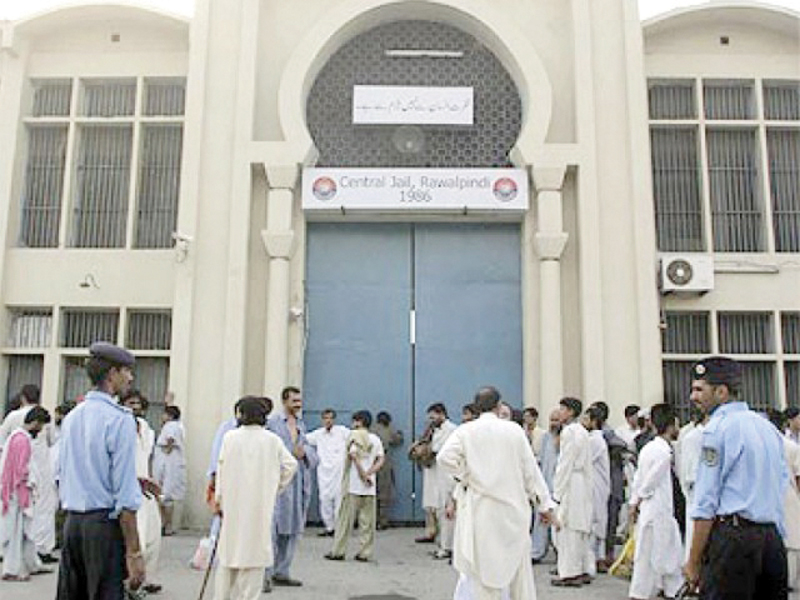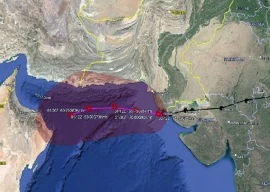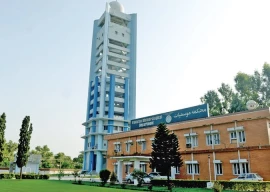
The federal government has designated six jails situated in Punjab as ‘high security prisons’ where hardcore militants, especially those that threaten the country’s security, will be detained and tried.
The move is aimed at ensuring foolproof detention of terror suspects and carrying out their speedy trials.
The interior ministry has issued three statutory regulatory orders (SROs), copies of which are available with The Express Tribune, to declare high security prisons, setting up regional headquarters besides appointment of a prosecutor general under Protection of Pakistan Ordinance, 2013.
The newly designated “high security” prisons in Punjab are in Lahore, Multan, Rawalpindi, Faisalabad, Mianwali and Sahiwal. There is a specific mention of Adiyala prison declared as high security prison by the federal government with the consent of Punjab government.
Sources say the move is aimed at keeping terrorists detained from other provinces as well as from federal capital in Adiyala prison for the purposes of the Protection of Pakistan Ordinance, 2013.
Under the Protection of Pakistan Ordinance, 2013, courtrooms will be established within the premises of the high security prison, along with the facility of recording evidence through video link.
The ordinance says safe houses will also be set up for the lodgment of prosecution witnesses and, if required, for their families as well during the period of investigation and trial, if required even for post trial period, protection will also be extended to prosecution witnesses for a period determined by the government.
As per document, the Punjab government has to take steps for the protection and security of six prisons and establish courtrooms in the premises of the high-security prisons and provide facilities of recording of evidence through video link.
The government has established three regional headquarters namely Rawalpindi, Multan and Lahore to take administrative control and maintain liaison with respective joint investigation teams, which will probe suspected terrorists. The territorial jurisdictions of regional headquarters have also been defined as Rawalpindi regional headquarter will comprise existing Rawalpindi and Sargodha region.
Lahore regional headquarter will comprise existing Lahore, Sheikhupura, Gujranwala and Faislabad regions. Regional headquarter at Multan will consist of existing Sahiwal, Multan, DG Khan and Bahawalpur region.
Furthermore, regional police officers in Rawalpindi and Multan and DIG( Investigation) Lahore have been designated as in-charge officers of these headquarters for the purpose of Protection of Pakistan Rules, 2013.
The government has also established a regional headquarter Islamabad for the administrative control, supervision and coordinated performance of joint investigation team having territorial jurisdiction within the limits of Islamabad Capital Territory.
Deputy Inspector General of Police (Headquarters), Islamabad has been appointed as in-charge of the Regional Headquarter in addition to his existing duties. Syed Muhammad Tayyab, public prosecutor Anti-Terrorism Court, Islamabad has also been appointed as prosecutor general under the PPO, 2013.
In exercise of the powers conferred by sub-section (1) of the section 11 of the Protection of Pakistan Ordinance, 2013, the government has appointed Additional Prosecutor General Punjab Mazhar Sher Awan as Regional Prosecutor General (Punjab).
The government has appointed director general of prosecution Asmatullah Gandapur as Regional Prosecutor General Khyber Pakhtunkhwa whereas senior public prosecutors in Anti-Terrorism Courts K-P have been assigned the job of public prosecutors in addition to their official duties.
Published in The Express Tribune, March 17th, 2014.























COMMENTS
Comments are moderated and generally will be posted if they are on-topic and not abusive.
For more information, please see our Comments FAQ